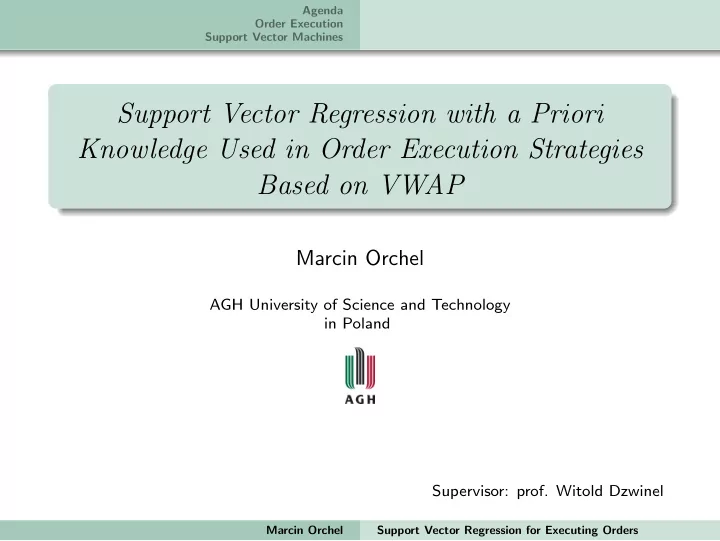

Agenda Order Execution Support Vector Machines Support Vector Regression with a Priori Knowledge Used in Order Execution Strategies Based on VWAP Marcin Orchel AGH University of Science and Technology in Poland Supervisor: prof. Witold Dzwinel Marcin Orchel Support Vector Regression for Executing Orders
Agenda Order Execution Support Vector Machines 1 Order Execution 2 Support Vector Machines Marcin Orchel Support Vector Regression for Executing Orders
Agenda Order Execution Support Vector Machines Volume Weighted Average Price (VWAP) Volume Weighted Average Price (VWAP) � n i =1 p ( i ) v ( i ) VWAP = � n i =1 v ( i ) p ( i ) is a price of the i -th trade, v ( i ) is a volume of the i -th trade market VWAP n is a number of all trades in T period, order VWAP n is a number of trades of the order o in T the popular measure of effectiveness of executing o is the ratio order VWAP/market VWAP; for buy orders lower ratio is better the ratio equal to 1 Marcin Orchel Support Vector Regression for Executing Orders
Agenda Order Execution Support Vector Machines VWAP, cont. consider dividing T to m -th T i periods Two Strategies of Optimizing the Ratio achieving the ratio equal achieving the ratio better to 1 than 1 requires prediction of requires prediction of volume participation for prices for every T i every T i volume participation for i -th time slice is v ( T i ) / v the result of both strategies is volume of o divided among all time slices an additional strategy is needed for trading in every time slice Marcin Orchel Support Vector Regression for Executing Orders
Agenda Order Execution Support Vector Machines Predicting Volume Participation prediction strategies, predict volume participation 1 for T i as an average of previous values for the same time slice 2 for T i as a previous time slice T i − 1 value 3 for all T i at once as the constant function 4 for all T i at once as the function based on historical data, using Support Vector Machines (SVM) volume of o divided accordingly to predicted volume participation expected lower variance of the final execution error for better method Marcin Orchel Support Vector Regression for Executing Orders
Agenda Order Execution Support Vector Machines Predicting Volume Participation using Support Vector Machines (SVM) a regression problem to solve Support Vector Regression used ( ε -SVR and δ -SVR) additional constraint for the solution m � v ( T i ) = 1 i =1 adjusting b of the solution of SVM to fulfill the constraint δ -SVR the regression problem is transformed to classification problems regression examples are duplicated and transformed in the way that original examples are translated up and duplicated examples are translated down by a value of δ Marcin Orchel Support Vector Regression for Executing Orders
Agenda Order Execution Support Vector Machines Hybrid Strategy divide volume of o for every time slice based on predicted volume participation and information about prices for time slices in rule form Example prices will probably be higher in the second part of T the hybrid strategy is to adjust volume participation by including rules about prices we propose to use ϕ -SVC to incorporate rules about prices to prediction of volume participation Marcin Orchel Support Vector Regression for Executing Orders
Agenda Order Execution Support Vector Machines ϕ -SVC Formulation allows to incorporate information about distances from examples to the margin in functional margin units minimization of = 1 w � 2 + � � � w , b , � C · � f � ξ 2 � � ξ a i ) ≥ 1 − ξ i + ϕ i , � with constraints: y i h ( � ξ ≥ 0 for i ∈ { 1 .. l } , where � C ≫ 0, ϕ i ∈ R , h ( � a i ) = � w · � a i + b the simple method of incorporation of price rules is to use some fixed value r of ϕ i , e.g. 0.5 for δ -SVR, e.g. set ϕ i = r for original examples for the second half of T , set ϕ i = r for duplicated examples for the first half of T Marcin Orchel Support Vector Regression for Executing Orders
Agenda Order Execution Support Vector Machines ϕ -SVC – Advantages ϕ -SVC can be used with δ -SVR, because δ -SVR transforms to classification problems which can be solved by ϕ -SVC ϕ -SVC can be used with ε -SVR, because it was shown that ε -SVR formulation is a special case of ϕ -SVC prior knowledge influence on the output function ϕ -SVC depends on performance of classification Marcin Orchel Support Vector Regression for Executing Orders
Agenda Order Execution Support Vector Machines Results data tested for NASDAQ-100 securities for about half year period T is a one dayperiods T is divided to 30 min time slices double cross validation used, inner cross validation used for finding the best values of parameters, outer cross validation replaced by shifting data training data 2 weeks, validation data 1 week while comparing volume participation prediction performance and variance of the final execution error ε -SVR and δ -SVR outperform the simple strategies, with similar results for the strategy based on averages from historical data additional information about prices improves the final execution error by about 20% Marcin Orchel Support Vector Regression for Executing Orders
Agenda Order Execution Support Vector Machines Conclusions general machine learning methods like SVM can be used effectively for order execution strategies by using prior knowledge about prices incorporated to ϕ -SVC we can create hybrid models for executing orders based on predicting volume participation and information about prices Marcin Orchel Support Vector Regression for Executing Orders
Recommend
More recommend